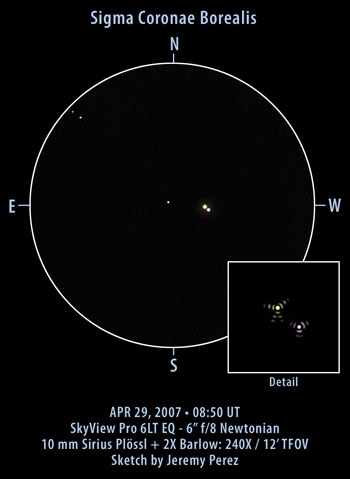
Click image for larger version.
Observation Notes:
Sigma Coronae Borealis was a beautiful multiple star. The primary was a rich yellow with a reddish purple secondary right next to it. A third component (the D star) lingered to the east. The two closest stars, A and B, were separated by the radius of 6 diffraction rings. This works out to 7.4 arcseconds. The 2007.3 value from Brian Workman’s double star calculator yields a separation of 7.15 arcseconds. I did not spot the C component, a 13th magnitude star 21 arcseconds to the west.
| Subject | Sigma Coronae Borealis (STF 2032) |
| Classification | Multiple Star |
| Position (J2000) | Corona Borealis [RA: 16:14:40.6 / Dec: +33:51:30]* |
| Position Angle* | AB: 237.1° (2007.3) / AC: 234° (1851) / AD: 89° (1836) |
| Separation* | AB: 7.15″ (2007.3) / AC: 21.2″ (1851) / AD: 43.8″ (1836) |
| Magnitudes* | A: 5.8 / B: 6.7 / C: 13.3 / D: 10.8 |
| Spectral Types* | – |
| Date/Time | APR 29, 2007 – 01:50 AM MST (APR 29, 2007 – 08:50 UT) |
| Observing Loc. | Flagstaff, AZ (Home) |
| Instrument | Orion SVP 6LT Reflector (150 mm dia./1200 mm F/L) |
| Eyepieces/Mag. | 10 mm + 2X Barlow (240X) |
| Conditions | Mostly clear, slightly breezy, nearly full moon |
| Seeing | 5-6/10 Pickering |
| Transparency | NELM Mag ~5.0 |
| References | The Washington Visual Double Star Catalog, 1996.0 (Worley+, 1996); Brian Workman’s Double Star Calculator |
*Based on published data.